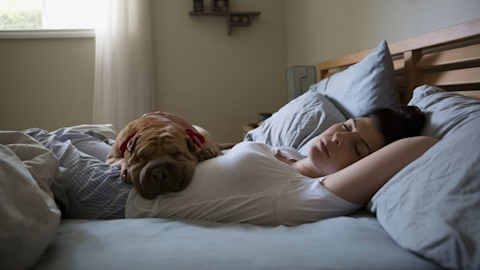12 tips for getting a better night’s sleep
Expert tips to improve sleep quality, boost energy and manage work stress for better rest.

Struggling to get a good night’s sleep? You’re not alone. Up to 40% of Aussie adults, opens in a new tab get inadequate sleep and according to research one of the primary reasons could be long working hours and work stress.
We spoke with Associate Professor and Clinical Psychologist, Aliza Werner-Seidler from the Black Dog Institute, opens in a new tab, who offered us some tips on what we can do to get a good night’s rest.
“Sleep plays a pivotal role in maintaining our overall health and wellbeing, influencing our cognitive, emotional, and physical health,” explains Aliza.
So, what can we do to get a better night’s sleep and wake up feeling ready to face a busy workday?
1. Stick to a steady sleep schedule
It can be tempting to sleep in after a busy week at work and stay up later on the weekends to make the most of your precious me-time away from the office. But maintaining a regular sleep-wake schedule, opens in a new tab by going to bed and waking up at the same time every day can help support a healthy sleep cycle.
2. Aim for 7-9 hours of sleep
Everyone's sleep needs vary, but Australian health guidelines suggest aiming for seven to nine hours of sleep, opens in a new tab each night for optimal good health. So, if you know you have an early meeting tomorrow, head to bed a little earlier tonight to ensure you’re getting enough shut-eye.
3. Unwind with a bedtime ritual
Developing a bedtime routine signals to your body that it's time to wind down and prepare for sleep, opens in a new tab. Things like reading, taking a warm bath, practising relaxation techniques or listening to calming music can help you relax. And don’t forget to turn off all work email notifications to avoid having your zen interrupted.
4. Cut down on screen time before bed
Reducing exposure to electronic devices before bedtime is essential for a good night’s sleep. Blue light emitted by laptops, phone and even TV screens can suppress melatonin production, the hormone that helps make us feel sleepy. Experts recommend avoiding blue light devices, opens in a new tab for at least two to three hours before you want to fall asleep.
5. Think about what you eat and drink at night
Avoid heavy meals, caffeine, nicotine, vapes and alcohol close to bedtime, opens in a new tab, as they can interfere with how long it takes you to fall asleep and disrupt sleep patterns. "On average, people sleep better when they last consumed caffeine eight to nine hours before going to bed," explains Aliza.
6. Stay active
Want an excuse to start that work soccer team or introduce a lunchtime run club? "Recent research, opens in a new tab has revealed compelling evidence suggesting that engaging in physical activity, regardless of intensity or form, can significantly improve sleep quality," says Aliza. Aim for at least 30-45 minutes of moderate exercise for at least five days a week.
7. Dim the lights in the evening
"Bright lights are known to suppress the production of melatonin, opens in a new tab, the hormone that regulates sleep-wake cycles, making it harder for your mind and body to relax," says Aliza. "Dimming the lights in the evenings helps signal to your body that it's time to sleep."
8. Nap wisely during the day
Some big name businesses in Australia now encourage napping on the job, opens in a new tab, offering employees sleep pods and nap rooms to try and counteract an ever exhausted work force. But, while short naps, opens in a new tab can be beneficial for boosting alertness and energy levels, we should avoid long or irregular naps during the day, as they can disrupt the sleep-wake cycle and make it harder to fall asleep at night.
9. Make your bedroom a sleep-friendly space
After a hectic day at the office, a cool, quiet and comfortable sleep environment is essential for a good night sleep. Invest in a comfortable mattress and pillows, use blackout curtains or an eye mask to block out light and use earplugs or white noise machines to minimise noise.
10. Quiet your mind
Making mindfulness a part of your everyday routine can help promote a more relaxed feeling at bedtime and stop stressful work ruminations. Consider a meditation app for your morning and evening commute and avoid working in the evenings to ensure a clear mind at bedtime.
11. Stick with your new sleep routine
Making long-term changes to your sleep patterns won’t happen overnight. Stick to your bedtime routine for a few weeks so it becomes a habit and work your way up to the recommended 7-9 hours of sleep a night to keep you looking and feeling your best.
12. Seek support
If you’re one of the 66% of Australian adults, opens in a new tab who live with a sleep problem such as insomnia or sleep apnoea, or you are undergoing hormonal changes, there is support and treatment available that can improve sleep quality. "During menopause, opens in a new tab, hormonal changes can lead to various symptoms that significantly disrupt sleep," explains Aliza. Speak to your GP for help and support.
"If you're still struggling with sleep issues despite trying these tips, reach out to your GP or a sleep specialist for additional support and guidance," says Aliza.
nib foundation, opens in a new tab partner, the Black Dog Institute, offers a free, evidence-based smartphone app called Sleep Ninja®, which has been shown to be effective in helping young people with sleep problems. Based on Cognitive Behavioural Therapy for Insomnia (CBT-I), Sleep Ninja teaches strategies across six ‘training sessions’ to develop healthy sleep habits and improve sleep quality. For more information, head to the Black Dog Institute website., opens in a new tab
The information contained in this article is provided as general information only and is not intended to be a substitute for professional medical advice, diagnosis, or treatment. For personalised medical advice, always consult your qualified healthcare professional.

Coffee, alcohol and sleep: How your morning and nighttime habits are causing problems at bedtime
Are you daily habits impacting your sleep more than you think?

What are the best foods to eat for concentration?
Need help focusing? These foods may help

Mindful management: How to support your team’s mental health
Mindful management is about having awareness of team needs, here we suggest effective ways you can support stressed out colleagues.

Dr Aliza Werner-Seidler
Dr Aliza Werner-Seidler is a Scientia associate professor and clinical psychologist at the Black Dog Institute. She has a PhD from the University of New South Wales and has undergone post-doctoral training at Cambridge University. Aliza’s areas of research include the prevention and treatment of depression and anxiety disorders in adolescence and young adults, as well investigating sleep disturbance as a contributing factor to mental illness. When Aliza is not working, you can find her escaping the city for the bush or beach, joyously listening to 90s trance music on the journey.